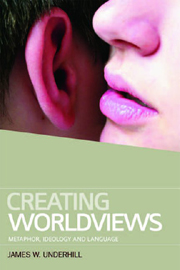Book contents
- Frontmatter
- Contents
- Acknowledgements
- Dedication
- Part I Metaphor
- 1 Metaphor and World-Conceiving
- 2 A Concern for Metaphor
- 3 Metaphors We Live By
- 4 Other Developments in Metaphor Theory
- 5 Further Cognitive Contributions to Metaphor Theory
- 6 Diversity on the Periphery
- Part II Case Studies in Metaphor
- Glossary
- Bibliography
- Index
3 - Metaphors We Live By
from Part I - Metaphor
Published online by Cambridge University Press: 12 September 2012
- Frontmatter
- Contents
- Acknowledgements
- Dedication
- Part I Metaphor
- 1 Metaphor and World-Conceiving
- 2 A Concern for Metaphor
- 3 Metaphors We Live By
- 4 Other Developments in Metaphor Theory
- 5 Further Cognitive Contributions to Metaphor Theory
- 6 Diversity on the Periphery
- Part II Case Studies in Metaphor
- Glossary
- Bibliography
- Index
Summary
The explosion of work on metaphor in recent decades has its roots in the ground-breaking book Metaphors We Live By, written by Lakoff and Johnson in 1980. Though the two authors have modified their position in separate and co-written works since then, and though cognitive approaches have moved on to other fields of linguistics, semantics and epistemology, and though they have introduced new paradigms for analysing metaphor, it is worth quoting the fundamental claims made in this work, since these claims have influenced the terms of the debate that revolves around the representation of conceptual constructs in language. The pith of these fundamental claims can be summed up in seven points:
Metaphors live. Following in the footsteps of the French philosopher, Paul Ricœur, Lakoff and Johnson argued that the figurative language of everyday expressions could not be considered as ‘dead metaphors’, because they exerted a lively influence upon the ways we formulate our ideas and express them. Many people organise their lives around metaphors like ‘time is money’. Others find a poignant emotional content in the expression ‘our relationship has broken down’. It is perfectly conceivable that the logic of the conceptual metaphor underlying the latter expression (Relationships are Machines) might induce the partners of a ‘dysfunctional’ relationship to treat their love as they would a washing machine which breaks down: that is to say, by throwing it out. The consequences of metaphors for behaviour led Lakoff and Johnson to argue that metaphors were conceptual patterns that we follow, or, as they put it, that ‘we live by’.
…
- Type
- Chapter
- Information
- Creating WorldviewsMetaphor Ideology and Language, pp. 25 - 29Publisher: Edinburgh University PressPrint publication year: 2011

